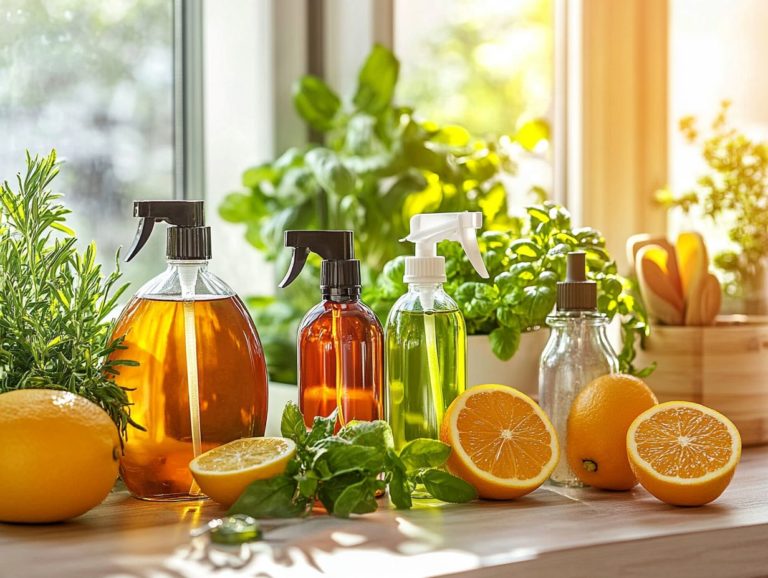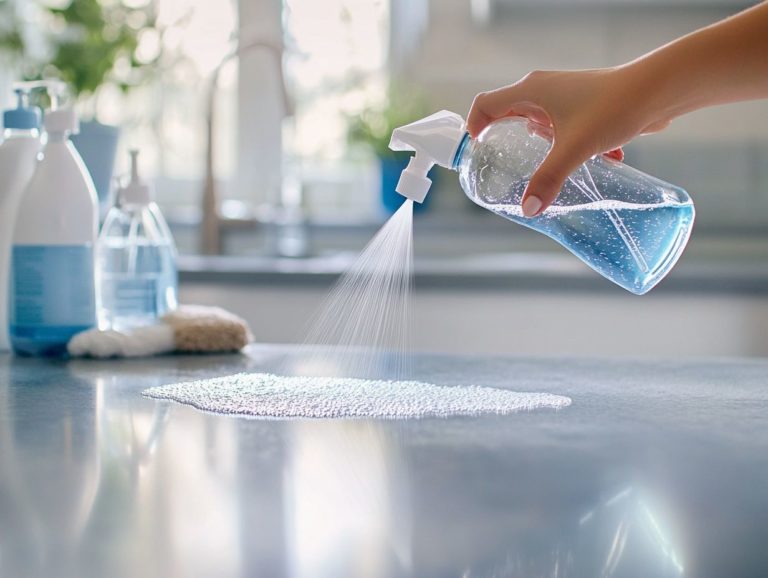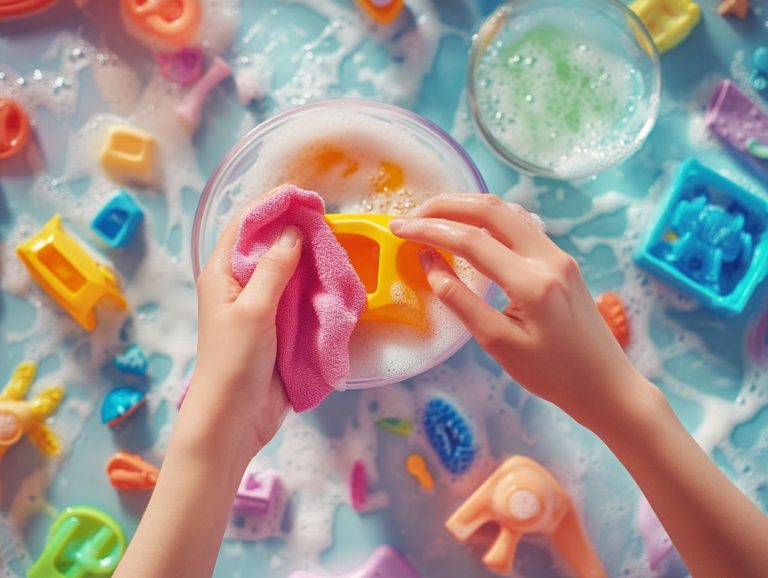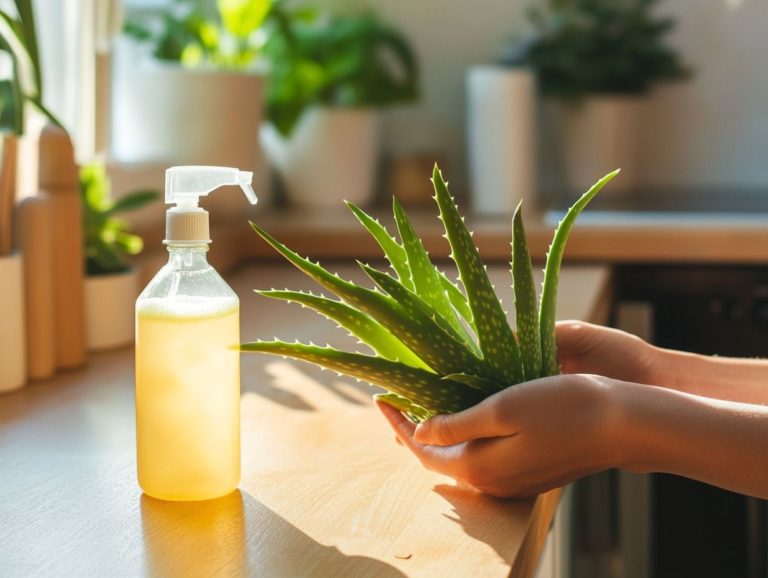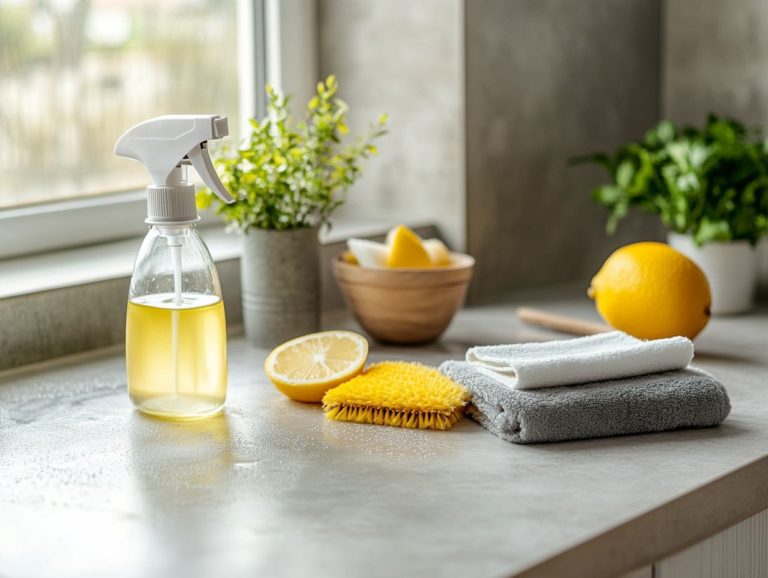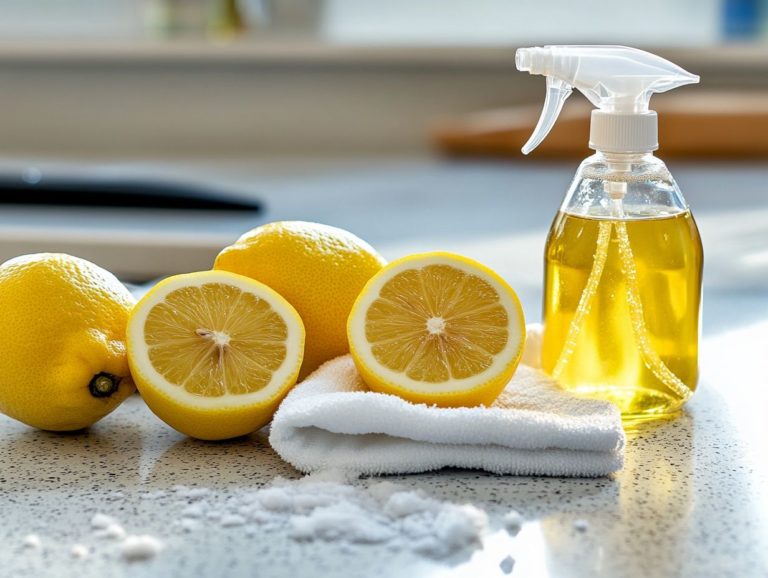What Are the Key Ingredients for Natural Cleaners?
In a world that increasingly values sustainability and health, the choice between natural and chemical cleaners has never been more significant for you.
Natural cleaners present a safer alternative for your home and family, all while being kind to the environment. This article delves into the multitude of advantages of opting for natural cleaners over their chemical counterparts, showcasing key ingredients such as vinegar, baking soda, and essential oils. You’ll also find effective natural cleaning recipes for various cleaning tasks.
Essential safety tips will empower you to use these natural products wisely. Get ready to transform your cleaning routine and embrace a healthier, greener home today!
Contents
- Key Takeaways:
- Why Choose Natural Cleaners over Chemical Cleaners?
- What Are the Key Ingredients for Natural Cleaners?
- How to Use These Ingredients for Cleaning?
- Are There Any Safety Precautions to Keep in Mind?
- Frequently Asked Questions
- What Are the Key Ingredients for Natural Cleaners?
- What are some common natural ingredients used in cleaners?
- Why are natural cleaners a better choice over traditional cleaners?
- Can I make my own natural cleaner at home?
- Are natural cleaners effective at cleaning and disinfecting?
- Are there any specific natural ingredients I should avoid in cleaners?
Key Takeaways:
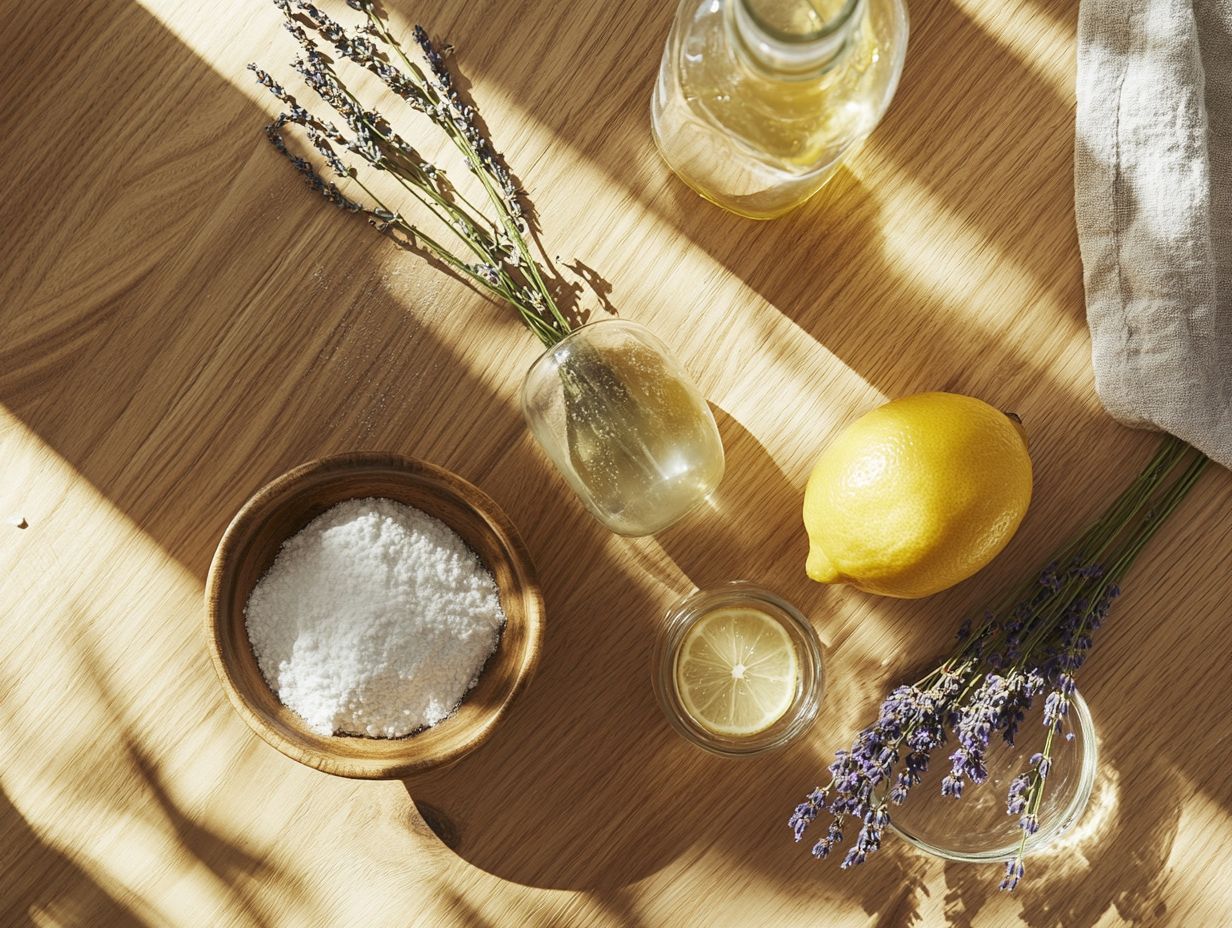
- Natural cleaners have both environmental and health benefits over chemical cleaners.
- Utilize ingredients like vinegar, baking soda, lemon juice, citrus peels, essential oils, borax, cornstarch, hydrogen peroxide, olive oil, and salt in natural cleaners.
- Consider important safety precautions when using natural cleaning products, such as proper dilution and storage methods.
Why Choose Natural Cleaners over Chemical Cleaners?
Choosing natural cleaners instead of chemical ones is a decision that enhances not only your health but also the environment around you. Many conventional cleaning products are loaded with harmful chemicals that can pollute indoor air and lead to a range of health issues, from respiratory problems to skin irritations and even mould and mildew.
DIY cleaners crafted from natural ingredients like baking soda, white vinegar, and essential oils offer effective cleaning power without the risks. By opting for chemical-free solutions, you’re not just fostering a safer home environment; you’re also taking steps to reduce your carbon footprint and champion sustainability.
Homemade cleaning products often use sustainable storage methods. This practice further reduces environmental impact.
What Are the Environmental Benefits?
The environmental benefits of using natural cleaners are substantial. By choosing these products, you help reduce pollution, minimize the use of harmful chemicals, and foster sustainable practices within your home.
This shift also lowers the environmental impact, contributing to the global movement for sustainability. When you opt for cleaning products made from biodegradable components, you’re contributing to a healthier planet.
These substances break down effortlessly, leaving no toxic residue behind. Plus, think about the reduction of plastic waste many brands now offer refillable options or use compostable packaging, significantly lightening the load on landfills.
The impact of chemical runoff from traditional cleaners can wreak havoc on local ecosystems. This leads to deteriorating soil and water quality.
By transitioning to natural alternatives, you protect aquatic life and promote biodiversity. You also play a crucial role in supporting the overall health of the environment.
What Are the Health Benefits?
Utilizing natural cleaners offers you a wealth of health benefits, particularly when it comes to enhancing indoor air quality and minimizing your exposure to harmful chemicals that can be released into the air.
The Environmental Protection Agency underscores the importance of using non-toxic alternatives to safeguard your well-being. These eco-friendly alternatives not only champion a cleaner environment but also play a vital role in reducing allergic reactions and respiratory issues that can be triggered by harsh synthetic substances.
According to the Good Housekeeping Institute, opting for plant-based ingredients can significantly decrease the risk of skin irritations and sensitivities, especially in vulnerable groups like children and individuals with pre-existing conditions.
Natural cleaners typically feature ingredients such as vinegar and baking soda. These are far less likely to release harmful chemicals that can be released into the air. This means you re creating a safer and healthier home environment for everyone who resides there.
Essential oils such as tea tree oil and lavender further boost the antimicrobial properties of your cleaning solutions.
Why not start today? Choose natural cleaners and make a positive change for your health and the planet!
What Are the Key Ingredients for Natural Cleaners?
To create effective natural cleaners, gather easily accessible household items. These items should be safe, nontoxic, versatile, and powerful against grime and stains.
Baking soda and white vinegar are your go-to cleaning agents. Essential oils like tea tree, lavender, and rosemary not only have antibacterial properties but also infuse your space with delightful fragrances.
Castile soap is a gentle yet effective base. Lemon juice acts as a natural disinfectant, making these components essential for your DIY cleaning recipes.
Soap nuts and other natural alternatives support a chemical-free approach. This benefits both your home and the planet.
Carolyn Fort from the Good Housekeeping Institute recommends incorporating these ingredients into your cleaning regimen for the best results.
Vinegar
White vinegar is a powerhouse among natural cleaning agents. It cuts through grease, removes stains, and deodorizes various surfaces.
When combined with olive oil, vinegar serves as a natural polish for wooden furniture. Its versatility makes it ideal for daily cleaning and tougher messes.
Mixing vinegar with water creates an effective window cleaner. It leaves glass surfaces streak-free and sparkling.
Vinegar’s acetic acid works as a natural disinfectant, eliminating harmful bacteria and germs from kitchen surfaces. It s also a reliable stain remover in your laundry routine.
This ingredient is invaluable for banishing stubborn stains from fabrics. Whether it’s wine or tomato sauce, it neutralizes odors effectively.
Use vinegar as a rinse aid in your dishwasher or as a natural fabric softener. Its adaptability makes it an essential staple in any eco-friendly cleaning toolkit.
Baking Soda
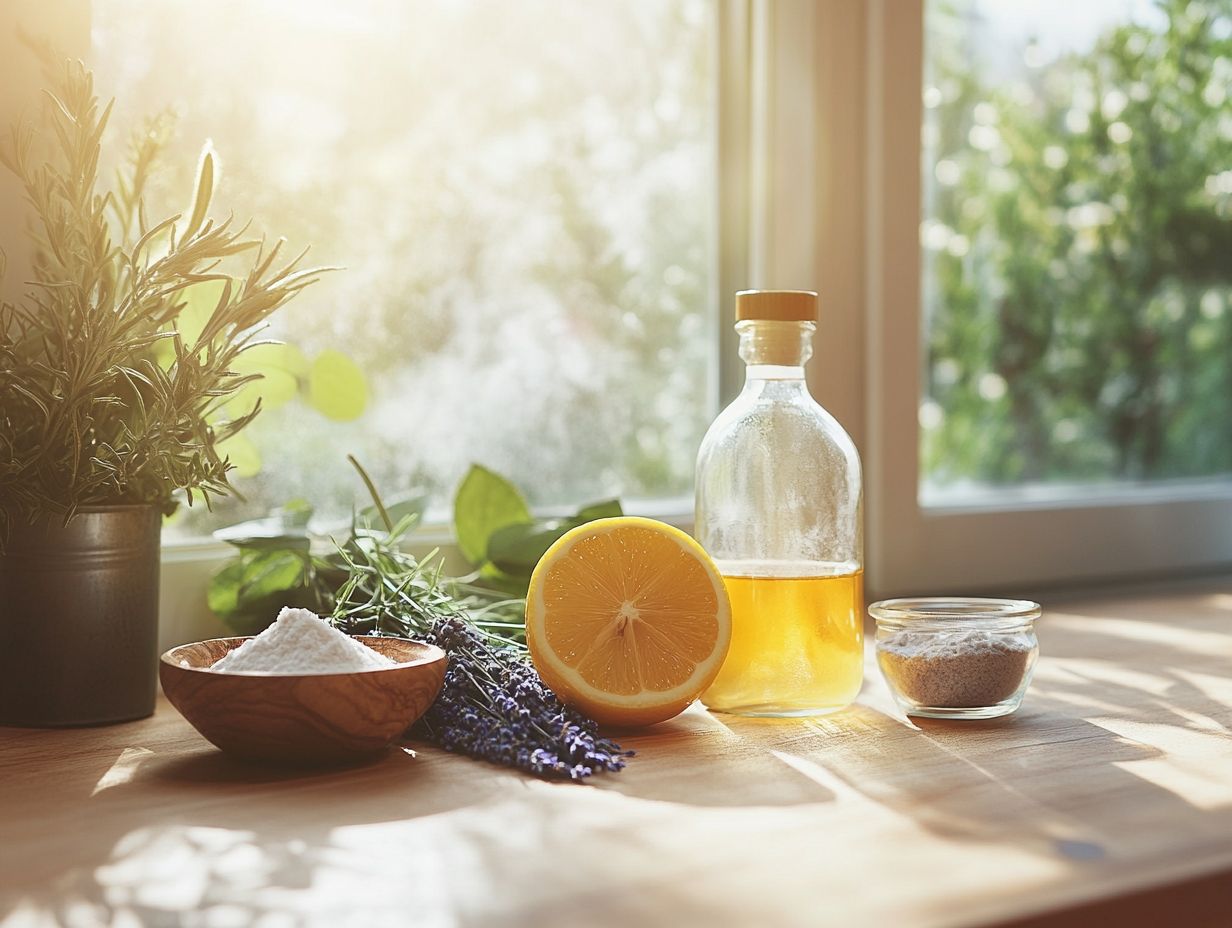
Baking soda is an exceptional nontoxic alternative for many cleaning tasks. It acts as a gentle abrasive and a natural deodorizer for carpets.
This versatile compound can be sprinkled on surfaces to lift grime and stubborn stains. It s a staple in countless households.
Baking soda’s ability to neutralize odors makes it effective for unpleasant smells in refrigerators, shoes, and laundry. Combining it with vinegar produces a powerful cleaning reaction, great for unclogging drains.
With its affordability and ease of use, baking soda is a favorite for eco-friendly cleaning solutions. It s a cornerstone in many DIY natural cleaning recipes.
Lemon Juice
Lemon juice is a powerful natural cleaning agent thanks to its acidic properties. It cuts through grease and banishes stains, making it essential in many cleaning recipes.
This versatile ingredient refreshes kitchen surfaces and laundry. Mixing lemon juice with baking soda tackles stubborn fabric stains effectively.
Its antibacterial qualities make it an excellent deodorizer. Use it to eliminate unwanted odors in your refrigerator or garbage disposal.
Creating a simple cleaning spray is easy: mix lemon juice with water for a non-toxic solution. The zesty aroma enhances cleanliness and promotes a warm, welcoming environment in your home.
Citrus Peels
Citrus peels, like those from oranges and grapefruits, can make your cleaning solutions better by leveraging their natural oils to boost cleaning power.
These peels provide a delightful fragrance and possess antibacterial properties that effectively combat stubborn grime. One popular DIY method involves infusing citrus peels in vinegar for two weeks. This results in a potent cleaner that cuts through grease and eliminates odors effortlessly.
Once infused, strain the mixture and dilute it with water for a versatile all-purpose cleaner. You can mix lemon zest with baking soda to create a scrubbing paste that’s perfect for tackling tough surfaces. By incorporating citrus peels into your cleaning routine, you can embrace an eco-friendly approach that is effective and aromatic.
Orange rinds and grapefruit peels are equally potent, contributing to a vibrant and fresh-smelling home.
Essential Oils
Essential oils like tea tree, rosemary, and lavender do more than just provide a lovely fragrance; they also have antimicrobial properties, making them invaluable in your natural cleaning recipes.
These oils can be used with other natural ingredients like Castile soap, which is a gentle soap made from vegetable oils, to enhance your cleaning solutions.
These natural wonders effectively combat bacteria, fungi, and viruses, giving them an advantage over some conventional cleaning agents. Tea tree oil, for example, is known for its potent antibacterial effects, making it a top choice for sanitizing kitchen and bathroom surfaces.
Rosemary oil not only enhances the cleaning process with its antimicrobial properties but also elevates the ambiance, turning mundane chores into a more enjoyable experience. The Good Housekeeping Institute recommends using these oils for a comprehensive, chemical-free cleaning strategy.
Lavender, famous for its soothing scent, can help eliminate harmful pathogens while reducing stress during your cleaning sessions. Incorporating these essential oils into your routine cultivates a healthier home without relying on synthetic chemicals. These nontoxic alternatives are recommended by experts like Carolyn Fort from the Good Housekeeping Institute.
Borax
Borax, a naturally occurring mineral, is your secret weapon in natural cleaning. It s renowned for its ability to enhance cleaning power and effectively deodorize fabrics. According to the Environmental Protection Agency, Borax is considered safe and eco-friendly when used correctly.
Think of this versatile compound as a laundry booster extraordinaire, adept at tackling tough stains and odors in clothing. Combining Borax with items like vinegar or baking soda unleashes a cleaning synergy that elevates their effectiveness, ensuring a deeper clean.
For example, mixing Borax with vinegar can break down stubborn soap residues and scale build-up in your appliances. Incorporating it into your carpet cleaning solutions neutralizes odors and lifts stains. Many eco-conscious households choose Borax for its safety and efficacy, making it an esteemed choice for cleaning carpets, bathrooms, and kitchens.
Cornstarch
Cornstarch is a remarkably versatile ingredient that not only thickens food but also serves as an effective cleaning agent in various natural cleaning recipes.
This pantry staple can revolutionize your cleaning routine, offering an eco-friendly solution that enhances shine and tackles messes effortlessly. For example, using cornstarch as a polish revives the luster of your furniture and windows, leaving a streak-free finish without harsh chemicals.
Additionally, it absorbs spills, especially oily substances, making it your go-to choice for quick cleanups. Simply sprinkle cornstarch on a fresh spill to lift stains from carpets or upholstery, proving that this kitchen staple is a formidable ally in maintaining a clean and inviting home.
Hydrogen Peroxide
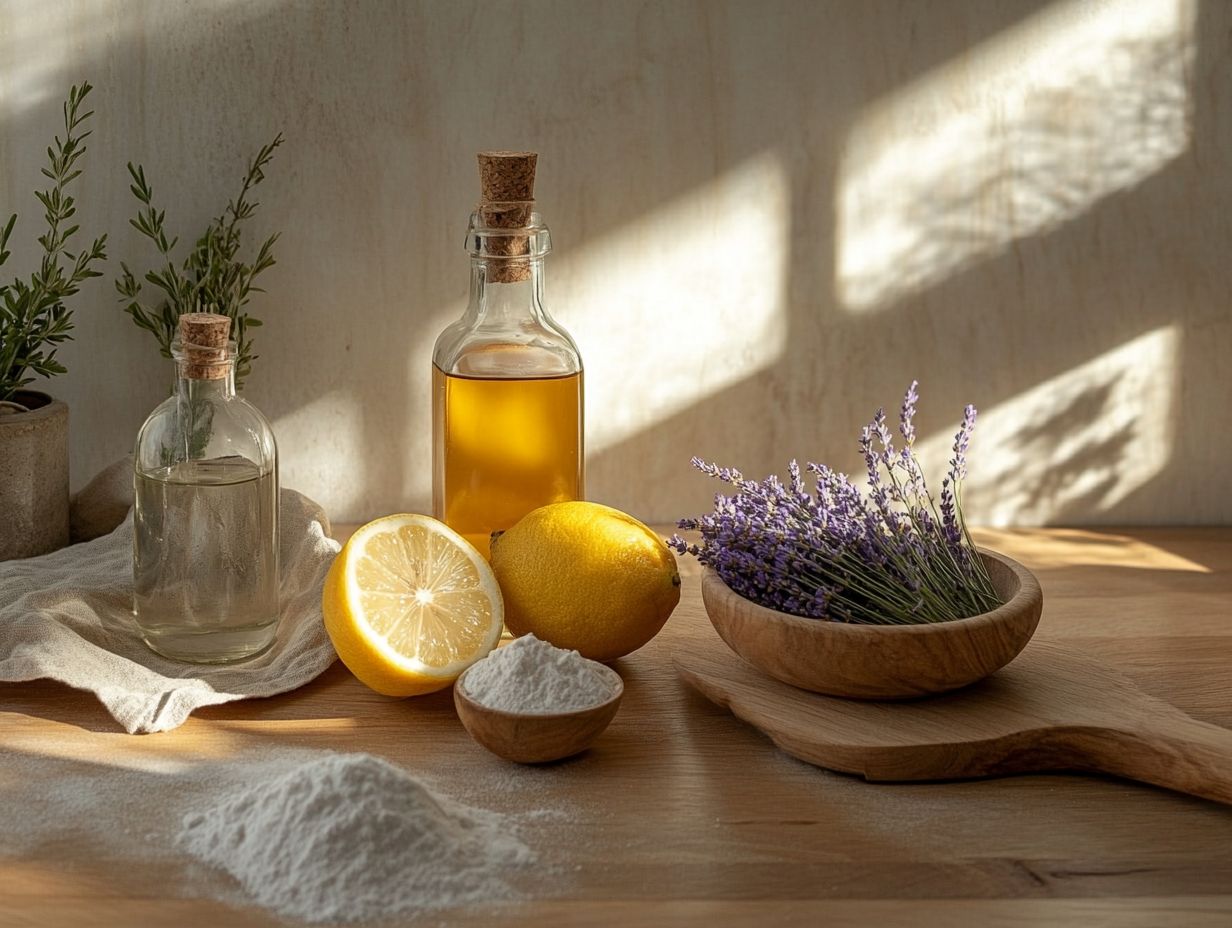
Hydrogen peroxide is a powerful natural disinfectant that you can use in many homemade cleaning solutions. It offers an eco-friendly alternative to regular disinfectants.
With its ability to kill germs, hydrogen peroxide is an excellent choice for maintaining a clean and healthy environment without harsh chemicals. When applied to surfaces, it quickly breaks down into water and oxygen, making it safe for the environment while effectively eliminating germs, bacteria, and viruses.
This versatile cleaner can be used for various tasks, from sanitizing kitchen counters to disinfecting bathroom fixtures. Its effectiveness at removing stains and odors solidifies its reputation as a multifunctional product that fits seamlessly into any cleaning routine.
How to Use These Ingredients for Cleaning?
Using natural ingredients for cleaning is straightforward and highly effective. You can craft your own DIY cleaners tailored to your home s cleaning needs. The Good Housekeeping Institute often highlights these DIY cleaners for their simplicity and effectiveness.
Recipes for Different Cleaning Needs
Creating your own natural cleaning products is a smart choice that saves money and benefits the environment. You have a variety of recipes at your fingertips, ready to tackle everything from all-purpose cleaners to carpet deodorizers.
By using simple household ingredients like vinegar, baking soda, and essential oils, you can easily make effective cleaning solutions that are safer for your family and the planet. For instance, a mixture of white vinegar and water is a powerful disinfectant for countertops. Meanwhile, combining baking soda with water creates a paste that effectively lifts tough stains from different surfaces. Carolyn Fort from Good Housekeeping recommends these nontoxic alternatives for everyday cleaning.
A few drops of lemon essential oil can enhance your cleaning process further, increasing antibacterial properties and adding a delightful scent that makes cleaning enjoyable.
Whether you’re tackling grime in the bathroom or refreshing your upholstery, these DIY recipes are versatile and can be tailored to meet your cleaning challenges. The Good Housekeeping Institute suggests these chemical-free products for an effective and safe cleaning experience.
Are There Any Safety Precautions to Keep in Mind?
While natural cleaners are generally safer than their chemical counterparts, it’s important to follow specific safety precautions. This ensures effective and safe use of these products throughout your home.
How to Properly Dilute Ingredients
Properly diluting ingredients is essential for crafting homemade cleaning solutions. It maximizes their effectiveness while ensuring your safety and minimizing irritation.
As you mix these solutions, it s vital to understand the specific ratios needed for each ingredient, as different substances can react unexpectedly. For example, when mixing vinegar and water, aim for a 1:1 ratio for optimal cleaning power. Just a few drops of essential oils are enough when mixed with a larger volume of a carrier like alcohol or water.
Using appropriate measuring tools, like graduated cylinders or measuring spoons, will enhance the accuracy of your mixtures. Additionally, clearly labeling your diluted solutions can prevent accidents and maintain safety standards. This way, you can achieve optimal cleaning results without adverse effects on your skin or surfaces.
How to Safely Store Natural Cleaning Products
Storing your natural cleaning products properly is crucial not just for keeping them effective, but also for ensuring safety in your home.
When you think about the best storage methods, consider where to keep these products. Ideally, they should be tucked away in cool, dark places, away from direct sunlight, to maintain the stability of their ingredients.
Proper labeling is another best practice; clearly marked bottles can save you from accidental misuse and make it easy to identify contents at a glance.
If you re using homemade solutions, remember to use them quickly to ensure they work effectively. Some ingredients may break down or become less effective over time.
Commercial natural cleaners usually come with expiration dates, indicating when the product is still safe and effective to use. It s wise to follow those guidelines for maximum effectiveness.
Frequently Asked Questions
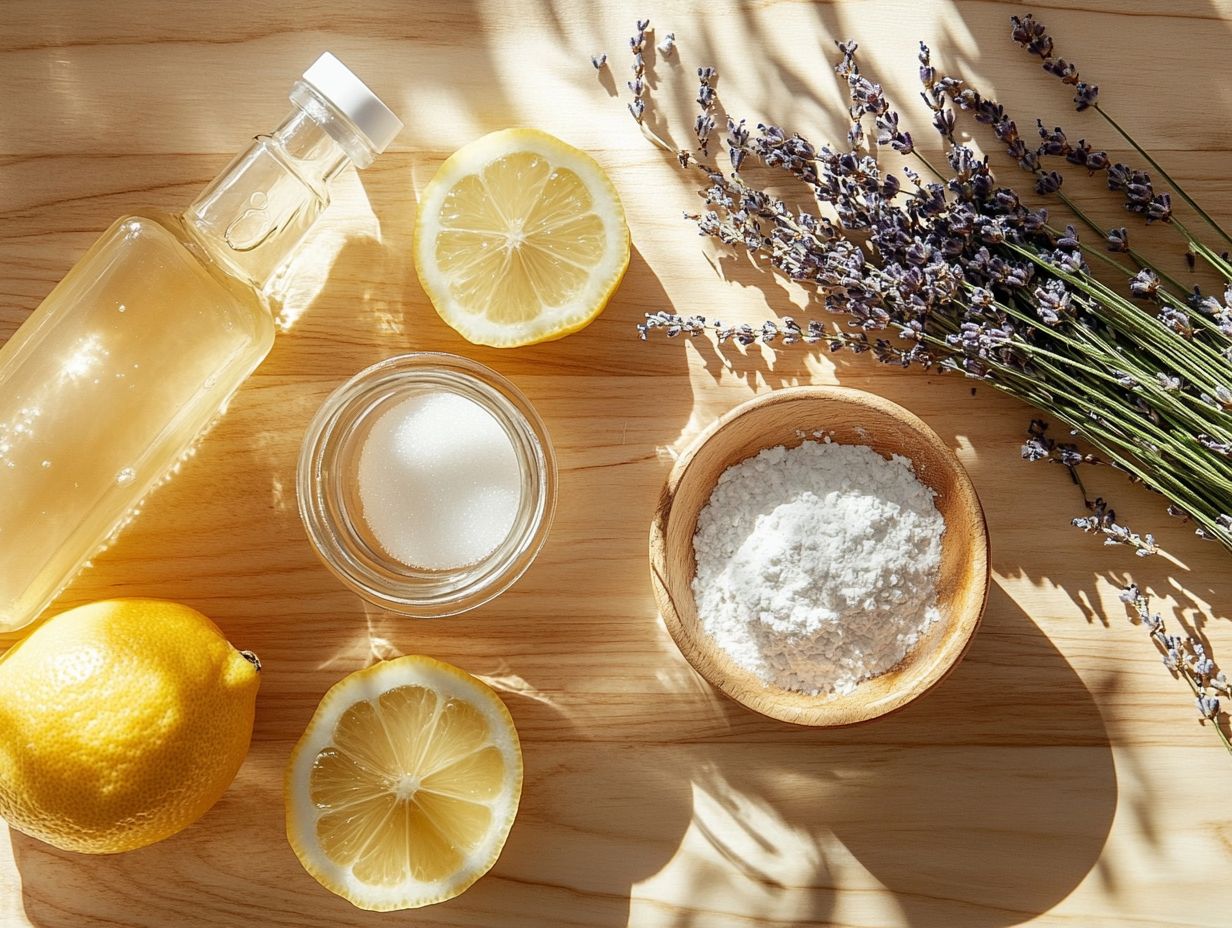
What Are the Key Ingredients for Natural Cleaners?
The key ingredients for natural cleaners typically come from plant-based sources and are free of harsh chemicals and additives.
What are some common natural ingredients used in cleaners?
Common natural ingredients include vinegar, baking soda, lemon juice, and essential oils.
Why are natural cleaners a better choice over traditional cleaners?
Natural cleaners are not just safe; they re a fantastic choice for your home! They are typically non-toxic, environmentally friendly, and safer for use around children and pets.
Can I make my own natural cleaner at home?
Yes! You can easily make your own natural cleaner at home using simple household ingredients like vinegar, baking soda, and essential oils.
Are natural cleaners effective at cleaning and disinfecting?
Yes! Natural cleaners can be just as effective at cleaning and disinfecting as traditional cleaners, especially when combined with other natural ingredients.
Are there any specific natural ingredients I should avoid in cleaners?
Some natural ingredients, like essential oils, can be harmful to certain surfaces and should be used with caution. It’s best to research any unfamiliar ingredients before using them in your natural cleaner.
Ready to try making your own natural cleaners? Dive in and enjoy the benefits of a safer, healthier home!

